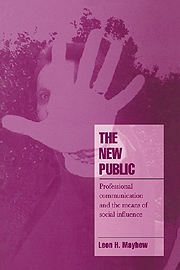1 - Public influence in modern society
Published online by Cambridge University Press: 06 September 2009
Summary
The complexities and intricacies of modern society are disturbing and perplexing. As observers we wonder how cohesion is possible in societies that can no longer be integrated by uniform adherence to conventional norms, and as citizens we search for public policies that can effectively include diverse people with disparate interests in a single societal community. We are tempted to conclude, with Yeats, that the center cannot hold.
What is this “center” that is losing its grip? Some observers assert that there is a special sector of society with specifically integrative functions, a sector variously identified as the public, societal community, or civil society, or possibly located in particular institutions such as law or voluntary association. Others question the authenticity of integrative institutions, even in democratic societies, charging that these institutions are mere covers for class and state domination. They doubt the independence and autonomy of so-called integrative institutions and deny that such institutions can provide moral guidance for society. This dispute goes beyond abstract sociological theorizing about social integration, for what is at stake are conceptions of the social foundations of democratic social orders.
In the traditions of democratic theory, hopes for a vital center have rested on establishment of a properly organized public life. Self-guidance of a modern society depends on a public capable of discussing and resolving issues and forming an effectual collective will. The ideals of public discussion were well stated by the Enlightened philosophers in the eighteenth century, but by the mid twentieth century, many critical thinkers had concluded that prospects for enlightenment in the modern world were dim.
- Type
- Chapter
- Information
- The New PublicProfessional Communication and the Means of Social Influence, pp. 3 - 20Publisher: Cambridge University PressPrint publication year: 1997

